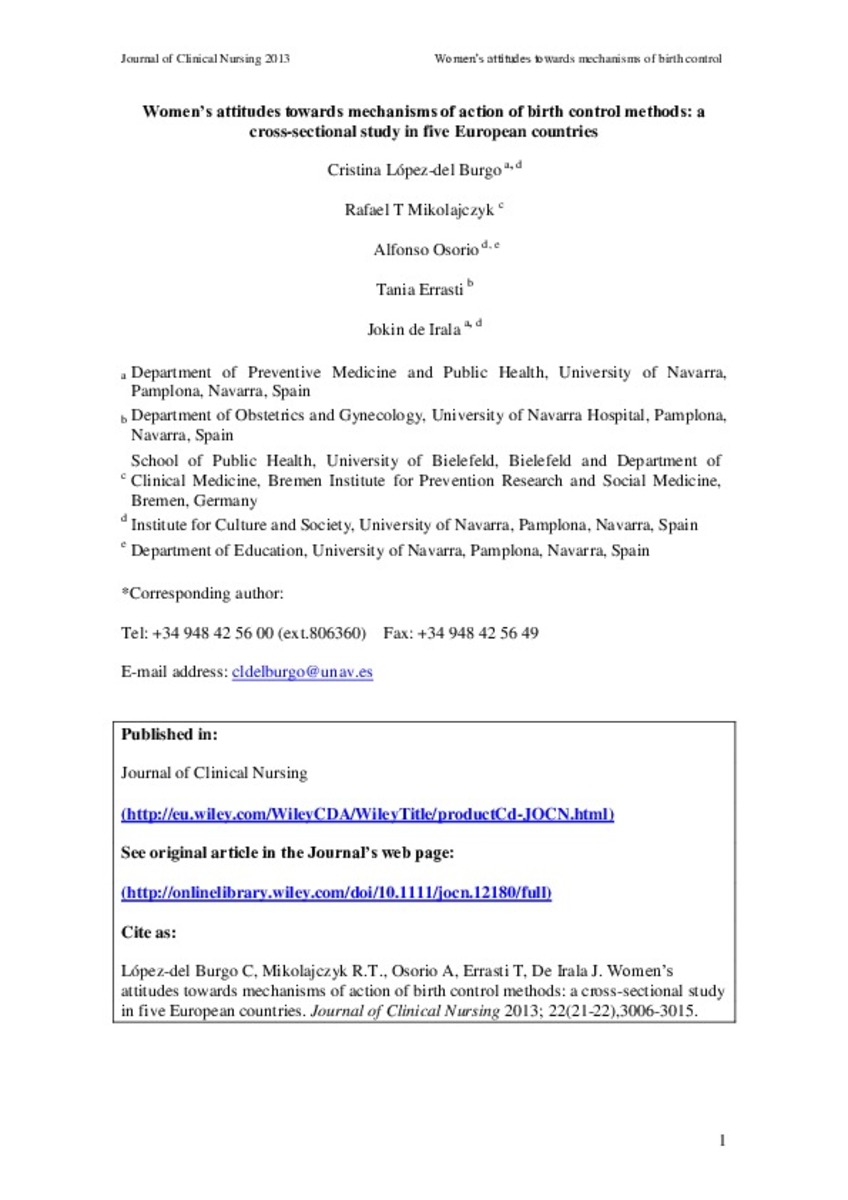Full metadata record
| DC Field | Value | Language |
|---|---|---|
| dc.contributor.author | Lopez-del-Burgo, C. (Cristina) | - |
| dc.contributor.author | Mikolajczyk, R.T. (Rafael T.) | - |
| dc.contributor.author | Osorio, A. (Alfonso) | - |
| dc.contributor.author | Errasti, T. (Tania) | - |
| dc.contributor.author | Irala, J. (Jokin) de | - |
| dc.creator | Lopez-del-Burgo, C. (Cristina) | - |
| dc.creator | Merrigan, T. (Terrence) | - |
| dc.creator | Osorio, A. (Alfonso) | - |
| dc.creator | Errasti, T. (Tania) | - |
| dc.creator | Irala, J. (Jokin) de | - |
| dc.date.accessioned | 2013-11-04T10:53:30Z | - |
| dc.date.available | 2013-11-04T10:53:30Z | - |
| dc.date.issued | 2013 | - |
| dc.identifier.citation | López del Burgo C, Mikolajczyk R , Osorio A , Errasti T, De Irala J. Women’s attitudes towards mechanisms of action of birth control methods: a cross - sectional study in five European countries . Journ countries . Journ countries . Journal of Clinical Nursing 2013 ;22(21-22):3006-15. | es_ES |
| dc.identifier.issn | 1365-2702 | - |
| dc.identifier.uri | https://hdl.handle.net/10171/34346 | - |
| dc.description.abstract | Aims and Objectives: To assess women’s attitudes towards the mechanisms of action of birth control methods. Background: When addressing women’s knowledge of and attitudes towards birth control methods, researchers frequently focus on side effects, effectiveness or correct use. Women’s opinions about mechanisms of action have been much less investigated and research is usually concentrated on the EC pill. Design: Cross-sectional study. Methods: Women, aged 18-49, from Germany, France, the UK, Sweden and Romania were randomly selected (N=1137). They were asked if they would use a method that may work after fertilization or after implantation and if they would continue using it after learning it may have such effects. Logistic regression was performed to evaluate the influence of certain characteristics on women’s attitudes. Results: Almost half of women in Romania and Germany would not use methods with postfertilization effects, while the lowest percentages were found in Sweden and in France. Regarding methods with postimplantation effects, higher percentages were found in all the countries. Highly educated women and those using a highly effective method were more likely to use methods with postfertilization effects. On the contrary, married women, those who stated that human life begins at fertilization and women with middle/high religiosity were less likely to consider using methods that may act after fertilization. Conclusions: One third of European women reported that they would not consider using a method that may have postfertilization effects. Relevance to clinical practice: Given that postfertilization effects may not be acceptable to some women, informing them of which methods may have these effects is essential to obtaining complete informed consent and to promoting women’s autonomy. | es_ES |
| dc.language.iso | eng | es_ES |
| dc.rights | info:eu-repo/semantics/openAccess | es_ES |
| dc.subject | Emergency contraceptive pill | es_ES |
| dc.subject | Family Planning | es_ES |
| dc.subject | Informed consent | es_ES |
| dc.subject | Intrauterine device | es_ES |
| dc.subject | Mechanism of action | es_ES |
| dc.subject | Oral contraceptives | es_ES |
| dc.subject | Postfertilisation effects | es_ES |
| dc.title | Women's attitudes towards mechanisms of action of birth control methods: a cross-sectional study of five European countries | es_ES |
| dc.type | info:eu-repo/semantics/article | es_ES |
| dc.relation.publisherversion | http://onlinelibrary.wiley.com/doi/10.1111/jocn.12180/full | es_ES |
| dc.type.driver | info:eu-repo/semantics/article | es_ES |
Files in This Item:
Statistics and impact
Items in Dadun are protected by copyright, with all rights reserved, unless otherwise indicated.






